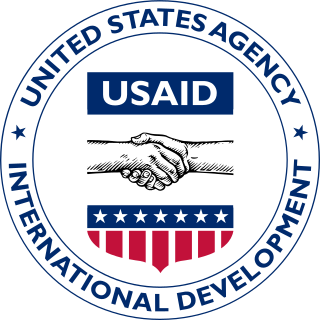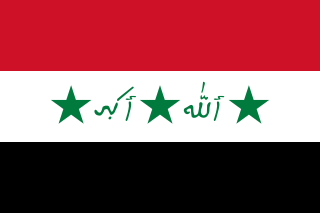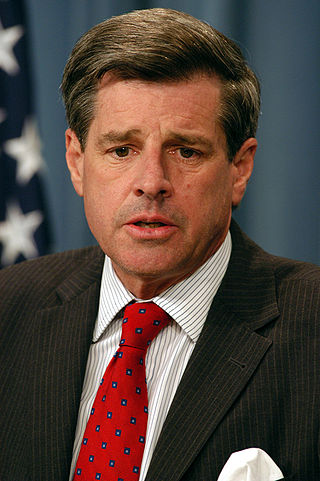
The economy of Iraq is dominated by the oil sector, which has provided about 99.7% of foreign exchange earnings during its modern history. As of 2021, the oil sector provides about 92% of foreign exchange earnings. Iraq's hitherto agrarian economy underwent rapid development following the 14 July Revolution (1958) which overthrew the Hashemite Iraqi monarchy. It had become the third-largest economy in the Middle East by 1980. This occurred in part because of the Iraqi government's successful industrialization and infrastructure development initiatives in the 1970s, which included irrigation projects, railway and highway construction, and rural electrification.

The United States Agency for International Development (USAID) is an independent agency of the United States government that is primarily responsible for administering civilian foreign aid and development assistance. With a budget of over $27 billion, USAID is one of the largest official aid agencies in the world and accounts for more than half of all U.S. foreign assistance—the highest in the world in absolute dollar terms.

The Coalition Provisional Authority was a transitional government of Iraq established following the invasion of the country on 19 March 2003 by U.S.-led Coalition forces. The invasion marked the fall of Ba'athist regime led by Saddam Hussein.

Lewis Paul Bremer III is a retired lobbyist for American weapons manufacturers. He was the second de facto head of state of Iraq as leader of the Coalition Provisional Authority (CPA) following the 2003 invasion of Iraq by the United States, from May 2003 until June 2004.

The Occupation of Iraq (2003–2011) was characterized by a large United States military deployment on Iraqi territory, beginning with the US-led invasion of the country in March 2003 which overthrew the Ba'ath Party government of Saddam Hussein and ending with the departure of US troops from the country in 2011. Troops for the occupation came primarily from the United States, the United Kingdom, and Australia, but 29 other nations also provided troops, and there were varying levels of assistance from Japan and other countries, as well as tens of thousands of private military company personnel.

A Provincial Reconstruction Team (PRT) was a unit introduced by the United States government, consisting of military officers, diplomats, and reconstruction subject matter experts, working to support reconstruction efforts in unstable states. PRTs were first established in Afghanistan in early 2002, and were used in Iraq as well. While the concepts are similar, PRTs in Afghanistan and Iraq had separate compositions and missions. Their common purpose, however, was to empower local governments to govern their constituents more effectively.
Investment in post-2003 Iraq refers to international efforts to rebuild the infrastructure of Iraq since the Iraq War in 2003. Along with the economic reform of Iraq, international projects have been implemented to repair and upgrade Iraqi water and sewage treatment plants, electricity production, hospitals, schools, housing, and transportation systems. Much of the work has been funded by the Iraq Relief and Reconstruction Fund, and the Coalition Provisional Authority.

Andrew S. Natsios is an American public servant and Republican politician originally from Massachusetts, who served in a number of positions in the administrations of Governor Paul Cellucci and President of the United States George W. Bush.
In May 2003, following the invasion of Iraq in March of that year, the Central Bank of Iraq-Development Fund for Iraq (DFI) account was created at the U.S. Federal Reserve Bank of New York at the request of the Coalition Provisional Authority (CPA) Administrator. A part of the fund has been transferred to Baghdad and Iraq, and the DFI-Baghdad account was opened at the Central Bank of Iraq "for cash payment requirements". The fund also eventually received money from seized and "vested" Iraqi bank accounts and funds seized by coalition forces. $650 million of this amount belongs to Uday Saddam Hussein, the older son of the former Iraqi president. The DFI have been disbursed mainly for "the wheat purchase program, the currency exchange program, the electricity and oil infrastructure programs, equipment for Iraqis security forces, and for Iraqi civil service salaries and ministry budget operations".

The U.S. rationale for the Iraq War has faced heavy criticism from an array of popular and official sources both inside and outside the United States. Putting this controversy aside, both proponents and opponents of the invasion have also criticized the prosecution of the war effort along a number of lines. Most significantly, critics have assailed the U.S. and its allies for not devoting enough troops to the mission, not adequately planning for post-invasion Iraq, and for permitting and perpetrating widespread human rights abuses. As the war has progressed, critics have also railed against the high human and financial costs.
Marla Ruzicka was an American activist-turned-aid worker. She believed that combatant governments had a legal and moral responsibility to compensate the families of civilians killed or injured in military conflicts.

Stuart W. Bowen Jr., is an American lawyer who served as the Special Inspector General for Iraq Reconstruction (SIGIR) from October 2004 to October 2013. He previously served as the Inspector General for the Coalition Provisional Authority (CPA-IG), a position to which he was appointed in January 2004. Mr. Bowen's mission includes ensuring effective oversight of the $63 billion appropriated for Iraq's relief and reconstruction.

The Office of the Special Inspector General for Iraq Reconstruction (SIGIR) was created as the successor to the Coalition Provisional Authority Office of Inspector General (CPA-IG). SIGIR was an independent government agency created by the Congress to provide oversight of the use of the $52 billion U.S. reconstruction program in Iraq. Stuart W. Bowen Jr. was appointed to the position of CPA-IG on January 20, 2004 and served until its closure in October 2013. Sand served until its closure in October 2013. SIGIR reported directly to Congress, the Secretary of State, and the Secretary of Defense.
Foreign aid to Iraq has increased to handle reconstruction efforts.
The following is a partial accounting of financial costs of the 2003 Iraq War by the United States and the United Kingdom, the two largest non-Iraqi participants of the multinational force in Iraq.
Reconstruction in Afghanistan refers to the efforts to improve Afghanistan's governance as well as physical buildings and infrastructure following the overthrow of the First Islamic Emirate of Afghanistan by the United States. These efforts involved various groups including supranational organizations, the Afghan government, the US government and other foreign governments, and civilians. These efforts also include training civil administrators, improving essential services and public safety, supporting civil society and self-determination, and promoting the rule of law and economic development.

Over 80% of electricity in Iraq is generated by fossil fuels. As of 2023 the 30 gigawatts (GW) of installed capacity cannot meet summer peak demand.

The Special Inspector General for Afghanistan Reconstruction (SIGAR) is the U.S. government's leading oversight authority on Afghanistan reconstruction. Congress created the Office of the Special Inspector General for Afghanistan Reconstruction to provide independent and objective oversight of the Afghanistan Reconstruction funds. Under the authority of Section 1229 of the National Defense Authorization Act for Fiscal Year 2008, SIGAR conducts audit, inspections, and investigations to promote efficiency and effectiveness of reconstruction programs, and to detect and prevent waste, fraud, and abuse of taxpayer dollars. SIGAR also has a hotline that allows individuals to report suspected fraud.
International Relief and Development, Inc. (IRD), renamed Blumont, is an organization that purports to provide relief, stabilization, and development programs worldwide. In 2015, IRD was the subject of a Washington Post investigation that highlighted the organization's performance and management of taxpayer money. Among other irregularities, the organization had charged the US Government $1.1 million for staff parties and retreats at exclusive resorts. In January 2016, IRD announced that it was changing its name to Blumont and relocating to Madison, Wisconsin.
The Task Force for Business and Stability Operations (TFBSO) is a division of the U.S. Department of Defense established in 2006 to stabilize the post-invasion Iraqi economy, reduce unemployment, and attract foreign investors to Iraq. In 2009, TFBSO expanded operations to include Afghanistan. TFBSO founder and former Deputy Undersecretary of Defense Paul Brinkley described TFBSO stating: “We do capitalism. We’re about helping companies make money.”











